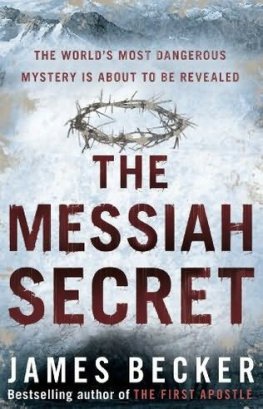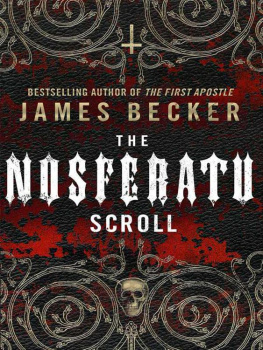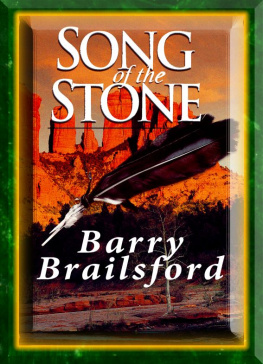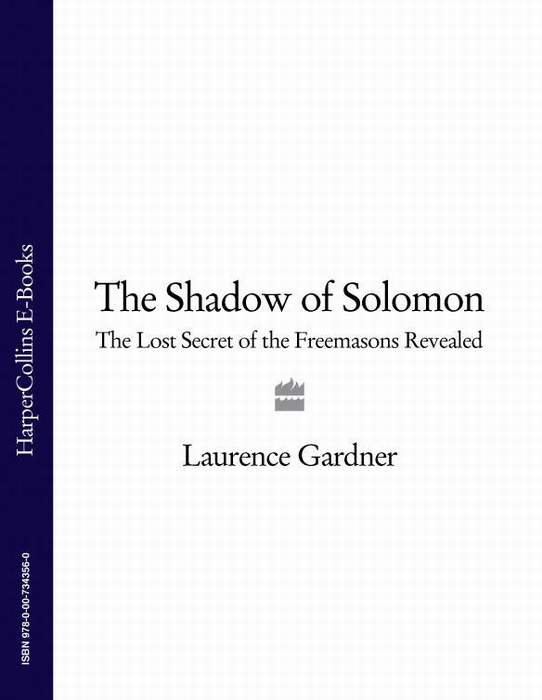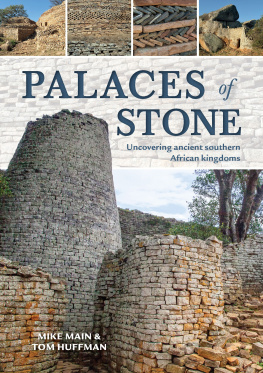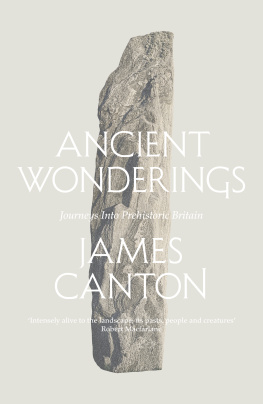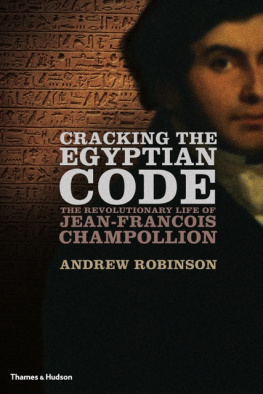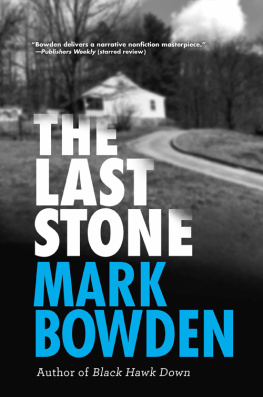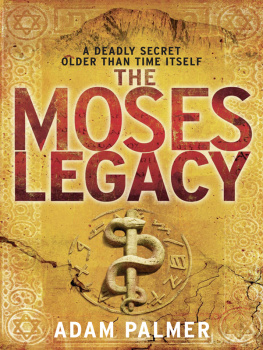The Moses Stone
James Becker
Table of Contents
About the Author
By the Same Author
Title Page
Copyright Page
Dedication
Acknowledgements
Prologue
Part One Morocco
Part Two England
Part Three Israel
Extract: THE MOSES STONE
Chapter 1
THE FIRST APOSTLE
THE HIDDEN OASIS
James Becker spent over twenty yearsin the Royal Navy's Fleet Air arm and served during the Falklands War.Throughout his career he has been involved in covert operations in many of theworld's hotspots; places like Yemen, Northern Ireland and Russia. He is anaccomplished combat pistol shot and has an abiding interest in ancient andmedieval history. His first novel, The First Apostle, is also publishedby Bantam Books.
www.rbooks.co.uk
Also by James Becker
THE FIRST APOSTLE
and published by Bantam Books
THE MOSES STONE
James Becker
This eBook is copyright material andmust not be copied, reproduced, transferred, distributed, leased, licensed orpublicly performed or used in any way except as specifically permitted inwriting by the publishers, as allowed under the terms and conditions underwhich it was purchased or as strictly permitted by applicable copyright law.Any unauthorised distribution or use of this text may be a direct infringementof the author's and publisher's rights and those responsible may be liable inlaw accordingly.
ISBN 9781409084365
Version 1.0
www.randomhouse.co.uk
TRANSWORLD PUBLISHERS
6163 Uxbridge Road, London W5 5SA
A Random House Group Company
www.rbooks.co.uk
THE MOSES STONE
A BANTAM BOOK
ISBN: 9781409084365
Version 1.0
First publication in Great Britain
Bantam edition published 2009
Copyright James Becker 2009
Penguin Group edition published 2010
Format: NOOKbook (eBook)
ISBN: 9781101185605
ISBN: 1101185600
James Becker has asserted his rightunder the Copyright, Designs and Patents Act 1988 to be identified as theauthor of this work.
This book is a work of fiction and,except in the case of historical fact, any resemblance to actual persons,living or dead, is purely coincidental.
A CIP catalogue record for this book is available from the British Library.
This electronic book is sold subjectto the condition that it shall not by way of trade or otherwise, be lent,resold, hired out, or otherwise circulated without the publisher's priorconsent in any form other than that in which it is published and without asimilar condition including this condition being imposed on the subsequentpurchaser
Addresses for Random House Group Ltdcompanies outside the UK can be found at: www.randomhouse.co.uk
The Random House Group Ltd Reg. No. 954009
2 4 6 8 10 9 7 5 3 1
To Sally, for everything
Acknowledgements
My heartfelt thanks go to SelinaWalker at Transworld, one of the most talented editors in the business, whoworked tirelessly to make sure that this book was as good as we could make it.Her ideas and suggestions helped shape and refine the manuscript and the finishedwork is so much the better for her efforts. Thanks also to all the other peopleinvolved in the publication and marketing of the book at Transworld andespecially the cover designers and the sales and marketing experts producingany book is a team effort, and they've done their absolute best to make surethe book gets on to as many shelves in as many bookshops as possible, andstands out from all the rest!
And, as always, my thanks to myagent Luigi Bonomi a good friend, a sounding-board for ideas and a source ofunrivalled inspiration. As I've said before, without him, I am nothing.
Prologue
Masada, Judea. AD 73
'We can wait no longer.'
Elazar Ben Ya'ir stood on a heavywooden table almost in the centre of the fortress and looked down at the facesof the men and women who surrounded him.
Outside the massive stone walls, atorrent of sound shouted orders, the noise of digging, and of stone fallingon stone formed a loud and continuous backdrop to his words. The racket wasinterspersed with the occasional thud and crack, as a missile from one of the ballistae,the massive Roman siege engines, crashed into the fortress walls.
Ben Ya'ir had led the Jewish Sicariirebels for the last seven years, ever since they'd seized Masada from theresident Roman garrison. The Sicarii were radical Zealots. They were soradical, in fact, that they now numbered even the Zealots themselves, as wellas almost everyone else in Judea, amongst their enemies. For over two yearsthey'd used the hilltop fortress as a base for raiding both Roman and Jewishsettlements throughout the country.
The previous year, Lucius FlaviusSilva, the Roman governor of Judea, had finally lost patience with the Sicariiand attacked Masada with the Fretensis legion some five thousand battle-hardenedsoldiers. But Masada was a tough nut to crack, and all the Romans' attempts tobreach its defences had failed. As a last resort, they had built a containingwall a circumvallation around part of the fortress and had thenbegun creating a ramp that could reach high enough to use a battering ram onthe massive wall that surrounded the citadel.
'You've all seen the rampart that isnow touching our walls,' Elazar Ben Ya'ir said, his voice strong but tingedwith resignation. 'Tomorrow, or the day after at the latest, the rams willbreach our defences. We can no longer prevent that, and when they break throughthe Romans will overrun us. We number less than a thousand men, women andchildren. Outside the walls, our enemies can muster five times that number.Make no mistake about this, the Romans will prevail, no matter howfiercely or bravely we fight.'
Elazar Ben Ya'ir paused and lookedaround. A salvo of arrows flew through the air from beyond the battlements,whistling over the heads of the assembled defenders, but hardly any of them somuch as glanced up.
'If we fight,' Ben Ya'ir continued,'most of us the lucky ones will be killed. Any who survive will be eitherexecuted, probably by crucifixion, or sold in the slave markets on the coast.'
An angry murmuring rose and fell inthe crowd in response to the words of their leader. The Romans had employed arefinement that had severely restricted the ability of the Sicarii toretaliate: they had forced slaves to construct the ramp, just as they would nodoubt use slaves to drive the battering rams. And to attack a fortress held byJews, the Romans had used Jewish slaves. To protect themselves, the Sicariiwould have had to kill their own enslaved countrymen something that eventhey, who were not noted for their compassion or tolerance towards anyone,found distasteful.
That was why they hadn't been ableto stop the building of the ramp; it was why they would not to be able to stopthe rams.
'Our choice is simple,' Ben Ya'irconcluded. 'If we fight, and if we aren't killed in battle, we will either dienailed to crosses in the valley below us or become slaves of the Romans.'
The crowd looked at him, theirmurmurs silenced.
'And if we surrender?' an angryvoice asked.
'That's your choice, my brother,'Elazar Ben Ya'ir replied, looking down at the young man who had spoken. 'Butyou'll still face slavery or crucifixion.'
'So what can we do, if we can'tfight and we can't surrender? What other choices do we have?' 'There is oneway,' Ben Ya'ir said, 'just one way, that we can achieve a victory here thatwill resound for all time.'
'We can defeat the Romans?'
'We can beat them, yes, but not inthe way you mean.'
'Then how?'
Elazar Ben Ya'ir paused for a fewmoments, looking round at the people with whom he'd shared his life and thefortress for the last seven years. Then he told them.
As night fell, the sound ofconstruction work outside the ramparts died away. Inside the citadel, teams ofmen made preparations for what would be the final act in the drama of Masada.



